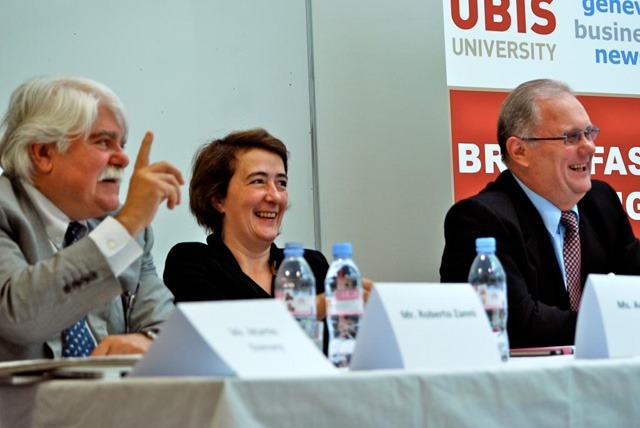
 On May, 27th 2014, Geneva Business News and the University of Business and International Studies (UBIS) organized the last Breakfast Meeting of the season at the UBIS campus, this time on the Hidden Job Market.
On May, 27th 2014, Geneva Business News and the University of Business and International Studies (UBIS) organized the last Breakfast Meeting of the season at the UBIS campus, this time on the Hidden Job Market.
Three panelists presented their work experience in large and smaller companies, as well as their own experiences with recruitment of candidates. The audience consisted of about 50 people of different ages, work experience and backgrounds.
Moderated by Mr. Martin Damary, Senior GBN contributor and expert on humanitarian issues, the panel included:
Mr. Alain Haut has a 35 year-career in global corporate management. He began by speaking about importance of having as many different types of experience as possible. According to Mr. Haut, starting with smaller companies has its advantages. Those who tend to want to demonstrate skills and learn get involved more in management, which speeds up the learning process. Companies like to recruit people who have had a first experience in a smaller company, knowing that it has probably helped them gain a deeper understanding of the real job market. On the other hand, Mr. Haut mentioned a few disadvantages of working for small companies, such as the fact that smaller companies generally mean smaller salaries, difficult upward mobility or job promotions, and sometimes being dependent only on one person, since some only have one manager for the whole company.
In terms of recruitment, he highlighted the fact that applying for smaller companies may be easier because applications usually do not go through human resources software. However, it is more difficult to find the offers, since smaller companies tend to not advertise as often.
Ms. Aurore Bui created the company SOFTWEB in 2001, which consults both commercial enterprise as well as associations and organizations. The company's main focus is on social and environmental projects, creating a link between donors and responsible companies.
Ms. Bui highlighted the importance of “telling a story” in the Curriculum Vitae, which shows our social skills, life experience and interests. Ms. Bui even recommended including information such as number of children, hobbies, traveling and volunteering. Life experience can be just as important as professional experience. Most importantly, Ms. Bui insisted that knowing a company’s culture is essential, as is the reflection it has on the structure of the company and its aims.
In contrast, Mr. Roberto Zanni, who has over 30 years of experience in large companies such as Japan Tobacco International and Kraft Foods, focused on the many advantages of working for larger company. One of them is that employees in bigger companies generally have better job security. He encouraged younger people especially to apply for jobs in bigger companies because they have higher budgets for trainings programs. Larger companies also like employees who “grow” in their environment, which can eventually lead to promotions. On the other hand, smaller and medium size companies might prefer to hire professionals who can bring experience to the table, and therefore those people have better chance when they apply for higher management positions.
Participants came out of the meeting with the feeling of having gained sound advice and better knowledge about the job market. They benefited from being encouraged to apply not only for large companies, but were also more aware of the advantages of working in smaller companies.
GBN and UBIS are reviewing the possibilities for renewing the Breakfast Series in the Fall.
Thank you, Petra, for the summary. The panel also emphasised that showing your work experience say at the McDonald's should not be an issue of shame this shows the willingness to work and gain experience.